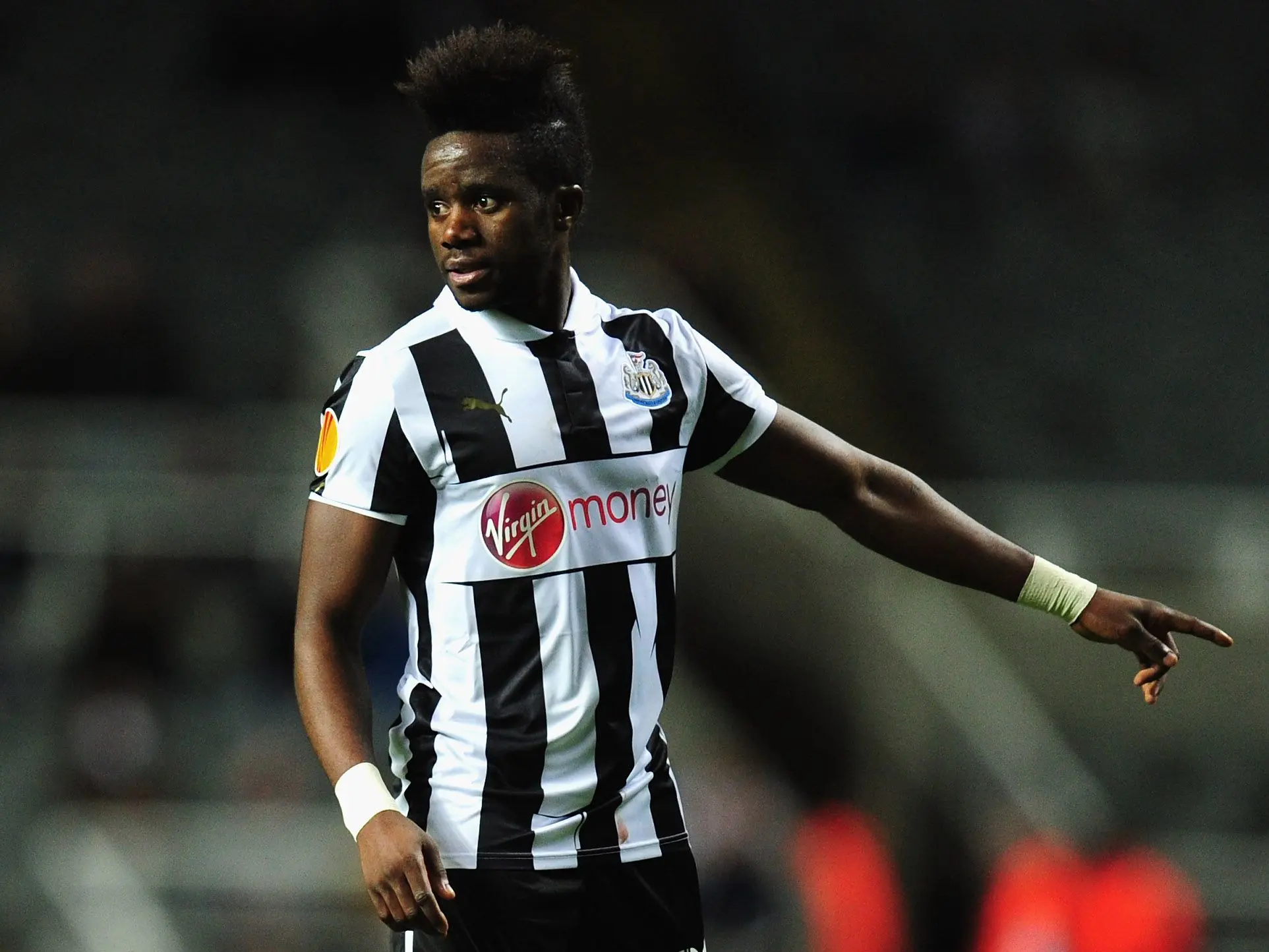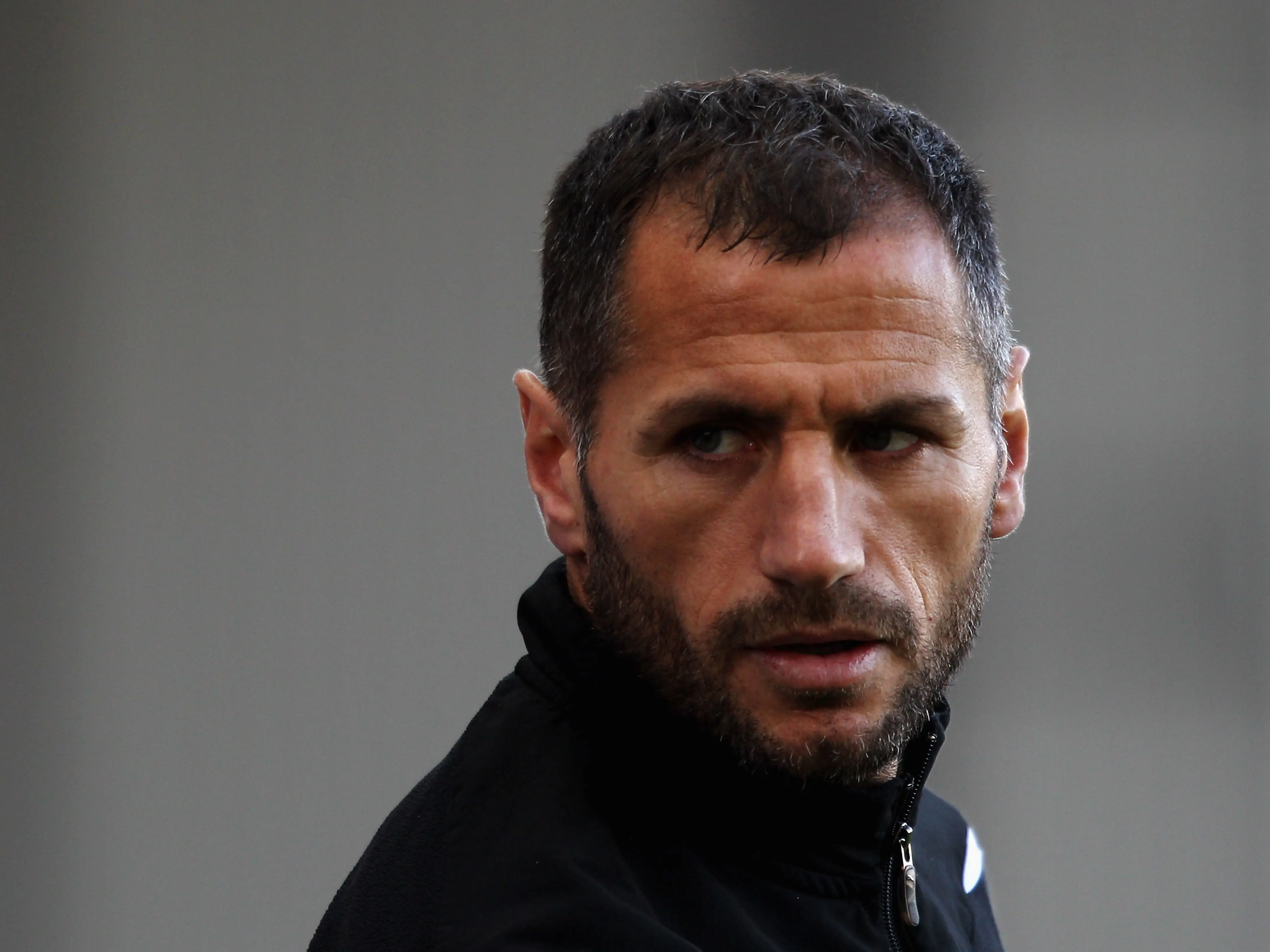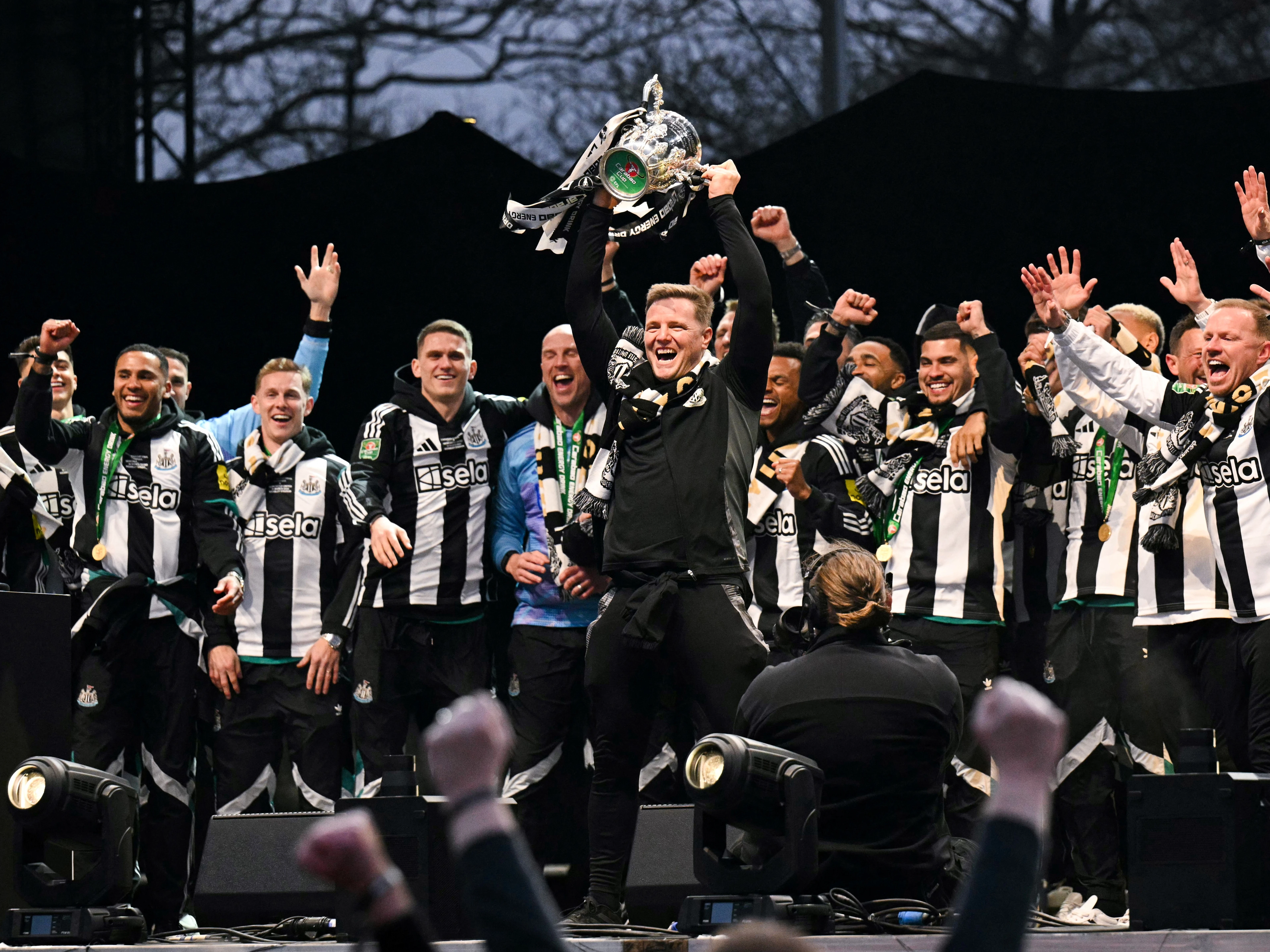Pardew had a plan of action and, despite not even making the bench for the previous week's Lisbon loss, Bigirimana was informed he would be starting the showpiece game in an unfamiliar role.
"Mr Pardew said that I would be starting as a right midfielder," Bigirimana tells newcastleunited.com. "My position is centre-mid, but he wanted me there for a specific reason.
"Any position he asked me to play to help the team, I would always be ready. The night was special, for the club, for the town. Being back at such a level in the quarter-final of the European League - it was an electrifying experience."
Most in the 52,000-strong crowd that night were a tad perplexed when they noted Bigirimana's name on the team sheet and they were even more confused to see him sprinting up and down the East Stand touchline. But by then he had more than endeared himself to supporters with his smile, enthusiasm and quality. If not quite a cult hero, Bigirimana had already taken the early steps down that path.
United's coaching staff had identified Benfica's Paraguayan left-back Lorenzo Melgarejo as a point of danger. Bigirimana's instructions were simple. "All (Pardew) said to me is, if you can help us and if we can get to half-time at nil-nil you've done your job.
"(Melgarejo) was very, very quick and very technically gifted. Pardew basically put me as a right wing-back to be able to track and stop their left-back. It worked."
Despite the occasion, the bright lights, the expectation and hope filling St. James' Park, Bigirimana felt no nerves. "I was actually enjoying myself because I know I can defend," he explains, eyes widening.
"I'm naturally a defender." Really? Yes, apparently, he started life as a centre-back before switching during Coventry academy days. "A fantastic gentleman called Greg Rioch decided I'd never become a centre-back in England because I wasn't growing. He put me into centre-midfield because he thought I'd become a better all-round player. It was the right call."
At the break, United still trailed by two on aggregate. Bigirimana had followed his instructions meticulously but also offered an outlet in the opposite direction. "On the ball I played well, creating some opportunities for us," he recalls. "There was one where Papiss (Cissé) was just offside after I put a cross in."
Wait. Papiss offside - surely not?! Bigirimana bursts into giggles before leaping to his friend's defence. "He could have been better with that, but strikers have to keep making runs. Even if it means you're offside five times, maybe the sixth, the seventh, you might not be. Then you change and influence the game."
As had been pre-ordained, Bigirimana was withdrawn after 45 minutes. If he had his time again, he might have politely queried the decision. "But I was a young player," he says. "I look back and think maybe I should have stood my ground and said, 'gaffer, I'm playing well here. Give me another 15 minutes.'
"However, it's always been 'team first' for me, so whatever the team needs. If it means you bring more attacking players to really go for it, to try and change the tide, then if that's what's right for the team, that's what is right for the team."
Shola Ameobi replaced Bigirimana, with Hatem Ben Arfa and Sylvain Marveaux both introduced late. The plan nearly worked. Cisse scored in the 71st minute. One more and United would progress on away goals. They pushed and pushed and pushed some more. Then in injury time Eduardo Salvio sapped the air from Tyneside. The crowd in unison rose to appreciate the squad's efforts over the tie.
***
Bigirimana joined United in July 2012 on a five-year contract. At 18, despite having started 16 games for Coventry and being named the Championship's apprentice of the year the previous season, he was marked as one for the future.
Yet that future came as swiftly as a month later when he completed both legs of United's Europa League play-off round victory over Greek team Atromitos. A Premier League debut followed in early September when he replaced Danny Simpson as a first-half substitute at Villa Park. His abiding memory of the day was Ben Arfa's equaliser.
"He scored a screamer with his right foot, and he was a very, very left-footed player. But the way he struck that; it was almost like he was both-footed.
"There's just something in me that loves to encourage people. One day at training I said to him, 'Hatem, you've got the ability to be the best player in this league. If you want to, you can easily become that.'"
This time Bigirimana is laughing at himself. "This is Newcastle's best player, and I've just signed from Coventry. Who am I to tell him what he can become? He's probably had legends in the game who have told him things. Who is Gael Bigirimana to say that to Hatem Ben Arfa?! But he was fond of me, to be honest.
"Obviously, whenever he wasn't happy or he felt like he wasn't being respected, he had a switch in him, and you didn't want to get on that side of him."
Did you ever get on his bad side? "No, no, but he would get kicked a lot in training. But if you're that type of player you have to come to terms with it. Because if you allow yourself to get entangled with frustration and start losing control, then that's going to affect you. You're going to become almost timid, and that ability will not shine as it should."
Bigirimana recalls one "fusion" between Cissé and Ben Arfa, but "it was done there and then."
Bigirimana made 24 appearances for United in 2012/13, far more than he had expected given he was jostling for minutes with Yohan Cabaye, Moussa Sissoko, Vurnon Anita, the late Cheick Tioté, Dan Gosling and even James Perch.
"It was a talented squad but unfortunately there were lots of injuries that season to the senior players, especially the attackers and some of the midfielders. We never had fluidity or continuity. However, if they didn't happen, I probably would have never got as many opportunities.
"I was brought in as a development player. I was somebody who would probably be in the reserves and travel with the first team just to get the experience of being around the team."
But Bigirimana's Christian faith comes coupled with a belief that things happen for a reason. "My little knowledge is that God is in control. I knew that I'd played at a decent level in the Championship and that was the reason Newcastle bought me. I didn't go there thinking I just wanted to be a reserve team player. I didn't go there with a coward's mindset or with fear. I went there to compete."
In pre-season, Bigirimana "didn’t look out of place" and that continued once the competitive action started. He recalls Pardew saying after a victory over Bordeaux that "my understanding of the game is beyond my age. He said that even when we were attacking, I was aware of where I needed to be if we lost the ball. There were many positives, and, after those early games, I knew I wasn't in at the deep end."
Bigirimana scored one goal for United in front of the Leazes in early December 2012 against Wigan. It was a freezing night, the cold running up through the concrete stands and permeating feet despite any number of pairs of socks. The team was on a four-game losing streak and it was about as unattractive a Monday Night Football fixture for the neutral as they come.
A contentious penalty and red card allowed Demba Ba to open the scoring early. Ba added another in the first half, before substitute Bigirimana curled in a left-footed effort from 20 yards much later.
"My first five minutes were actually awful," he recalls. "When I scored, Danny Simpson came to me and said, 'that goal has bailed you out because you were having one!'"
That strike was not Bigirimana's high point though. Instead, he cites back-to-back festive starts at Old Trafford (United lost 4-3) and the Emirates (United lost 7-3) as the pinnacle. He was taken off in both games, with the scores at 3-2 and 4-3 respectively.
"It's easy when you're young to be brought off even though you're playing really well," he says. "But again, it's about the team and you're losing.” Two days post-Arsenal, John Carver approached him. "He said, 'you've been one of our best performers in the last two games and we're going to rest you now. We're just going to make sure we give you a break.'
"I never understood why. Decisions have to be made by those who are in charge and whether it's the right decision or wrong decision, if they make it for the right reason, then you can accept that. But I never understood."
It clearly grated with Bigirimana back then and does so now. He was the path of least resistance perhaps, with the coaches knowing that such a polite, well-mannered youngster would not make a fuss.
"That's just the nature of humans," he explains. "If there's an easy route, if we can cut corners, without a shadow of a doubt, we'll do that.
"The staff are under pressure. They're telling me that I've been playing well and are encouraging me. Yet for them, the fear is we've just lost two games, and we are struggling. Their jobs could have been on the line."
A query as to who Bigirimana became close to at United draws an intriguing response. "I always find it difficult to single out anyone. Whenever I'm at a club, I see myself as a servant of the club. I want to be open, encouraging and be able to relate to different people, different characters, whether it might be (Fabricio) Coloccini or Sean Longstaff coming through the academy."
That said, Rolando Aarons was a groomsman at Bigirimana's wedding. His family had moved with him to Gosforth from Coventry and Aarons resided with a nearby host family. At least he did until Bigirimana "asked the club if he could come and live with us." The pair remain firm friends.
Quite what happened next is difficult to pinpoint. Despite his successful start at United, Bigirimana played just once more for the club during a League Cup tie at Morecambe in 2013/14. A strange loan to Rangers in the 2014/15 season resulted in zero appearances, before he returned to Coventry temporarily in 2015/16. By then, they had dropped to League One.
Despite having a year remaining on his contract, Bigirimana agreed to a mutual termination in order to re-join Coventry in August 2016. If he has carried one regret with him it is that he never got to work with Rafa Benítez.
Benítez replaced Steve McClaren at United in March 2016 while Bigirimana was out on loan. United were relegated to the Championship but the itch to play first team football proved too much. "When I look back it's always a worry for me," he begins. “Rafa Benítez never got to see me, and being a Spanish coach and how they see the game... even Ben Dawson, who was the reserve coach (at United), said that if (Rafa) saw me, he would like me because one of my strengths is passing. But I just wanted to move back to Coventry, and it felt right."
Bigirimana, recently married and expecting a baby with his wife, wanted to buy a family home. An agent pointed him in the direction of an investment scheme and his due diligence with accountants backed up the legitimacy of the set-up. The deal was that a lump sum investment would give a small-ish monthly pay out.
"But there was no continuity," he recalls. "After a few months there was no payment. Then it was all like, 'we're going to pay you next month, there's a misunderstanding'. All those sorts of things. Then it got to the point where the communication dried up."
It proved to be a Ponzi scheme. The Bigirimana family lost their entire savings.
If Bigirimana feels anger, he doesn't let on to newcastleunited.com. "We learned from the mistake. Our faith gave us perspective. There's a scripture in the Book of Job that says, 'God gives, and God takes away.' We just knew that God would bless us again one day."
After scoring a Wembley winner in the EFL Trophy Final for Coventry in April 2017, Bigirimana joined Motherwell in the Scottish Premier League that summer. After a successful season-and-a-half, he was loaned to Hibernian. He played just 36 minutes.
He was a free agent by the summer of 2019 and needed a deal to keep a roof over his family's head. A two-week trial at a Croatian club looked likely to be his saviour before a cruel last-minute twist left him stranded.
"I was waiting to board a flight at Birmingham Airport and rang the coach to ask if somebody would be waiting at the other end," he begins. "He told me not to come because they had a game the previous day and a striker got injured. They wanted to see if it was long-term or short-term. If it was long-term, they would prioritise a striker.
"It was a weird feeling. I just thank God just for the peace that I had. Okay, it's annoying, it's frustrating. They said to me, 'we're going to get back to you', but they never did." A common tale in football.
In hindsight, Bigirimana avoided being abroad when Covid hit, during which time he had to turn to the state for financial help. "It was challenging," he admits. "I remember one of my close friends said to me, 'it's one thing to get to the top. It's another thing to stay at the top. But it's even another thing when you're going to the top, you've worked hard and then you fall down, down, all the way.'
"Without the truth of the word of God, I know what could have become of me and what many, many other footballers in that situation would do. It's easy to become bitter, to blame everyone and try to numb the frustration, misery and pain. You can see why people go down the route of drinking and drugs."
Did his faith ever waver during those tough periods? "I am naturally very laid back, which is not a good thing. It's easy to be influenced, thinking 'oh, I trust God', but you're not really trusting God. You're just being lazy.
"There are times when you are challenged and you're not really walking as you should be walking or standing as you should be standing because that's when your natural self takes over. You become lazy and ill-disciplined. You're giving up, basically."
But Bigirimana did not give up. He enjoyed two successful years with Glentoran in Northern Ireland's top tier and, after a year in Tanzania, returned to the country to join Dungannon Swifts. In May he starred as they lifted the Irish Cup for the first time.
That, though, is part-time and with an eye on the future Bigirimana has established Bigi Elite Coaching, where youngsters hoping to make it in the game pick his brains during one-to-one sessions.
"I say to them, 'I've been in your future'. It's not going to be the same, but what I'm trying to say to them is that the principles don't change. The breakthrough, the ups, the downs, the agents, the decisions managers make.
"I always tell them football is played in the mind. Yes, we use our feet and our body, but it's the mind first. They need to be able to mould their mind to become strong characters and be able to deal with setbacks."
Did he pass any of that knowledge on to One Direction when they arrived for training ahead of the Benfica game? "No," he says laughing. Nor was he a fan. "I'd watched X Factor and knew who they were, but I'm not into that type of music.
"People who were into that kind of music took that opportunity to mingle with them and speak to them. The French guys didn't have a clue." Go on Bigi, name names - who was starstruck? "Sammy Ameobi and, if I'm not mistaken, Steven and Ryan Taylor!"




